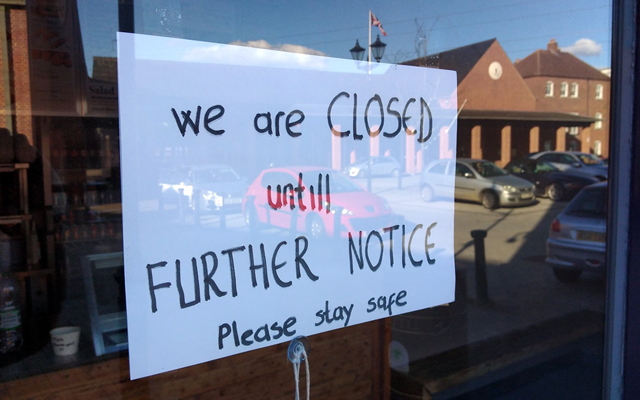It seems unreasonable to expect retailers to still pay rent if the government has ordered them to close their shops, so Adam Bernstein spoke to Asia Munir, from the Real Estate Litigation Team at law firm Walker Morris, to ask what options are available to tenants…
We’re living in unprecedented times where society has been turned on its head, businesses forcibly closed, and the public locked down. Not even during World War Two did we experience anything so severe. But while the NHS is in the front-line, businesses are finding – through no fault of their own – that their ability to pay bills has been curtailed. And of the bills, one of the biggest is rent relating to leased premises and many businesses are wondering what they can do to stay afloat.
Government action
The UK is tackling the challenges caused by the spread of coronavirus and it is clear that the outbreak will significantly disrupt a number of markets; it’s also clear that it is likely to be months rather than weeks before the spread of the virus, and its human and economic impact, begin to dissipate. As an expert in the field Munir says that “it is essential that tenants understand the implications for their real estate-related rights and liabilities.”
The problem for firms is that further to the guidance on self-isolation and staying at home and away from others, on 23rd March the government stepped up measures to prevent the spread of coronavirus. As Munir explains – and everyone already knows – “in order to prevent social contact, certain businesses have been ordered to close; guidance has been issued outlining the list of businesses requiring closure as part of social distancing measures.” She points to the relevant guidance that can be found at https://www.gov.uk/government/publications/further-businesses-and-premises-to-close/further-businesses-and-premises-to-close-guidance#businesses-and-premises-that-must-remain-closed In essence, though, only certain essential retailers such as supermarkets, bicycle shops, hardware stores, corner stores, and pharmacies can stay open.
Paying rent
By extension there are a number of key issues and concerns facing commercial tenants, not least of which is paying rent. Questions that Munir is seeing time and time again relate to whether a tenant can refuse to pay, defer payment, or pay less rent. In response she says that “the terms of your lease will govern whether you are able to suspend rent payments, though this will be unlikely. Strictly speaking, your landlord is still legally entitled to continue to demand rent from you.”
However, she says that in these exceptional circumstances, it is possible that your landlord is also thinking about commercial and reputational risks and might be flexible; after all, if a tenant goes to the wall the landlord will get 100 percent of nothing and with the high street already in trouble, they may be more flexible. Even so, as Munir points out, “there is nothing to legally require your landlord to reduce the rent or to agree to a deferral, however a reduction in rent could be negotiated between the parties.” As an example of rent concessions, she has seen a landlord drawing on rent deposits in order to alleviate cash flow issues for tenants. Nevertheless, no matter what is agreed, Munir adds that “it is important that any alternative agreements and arrangements are properly documented in order to avoid disputes.”
The government is doing its best in such trying times and the newly passed Coronavirus Act 2020 will provide a temporary safety net for tenants over the coming months. But before looking at the legislation, Munir turns first to a legal term that may be of assistance – ‘force majeure’.
As she describes it, “a force majeure clause typically relieves one or both parties from performing their obligations – in this case, under the lease – on the happening of events outside of their control.” She explains that where a contract becomes impossible to perform, a force majeure clause may assist in temporarily suspending the obligations under the lease such as payment of rent or making provision for early termination.
That said, a force majeure clause in a lease is rare and, in England and Wales, such a clause is not implied into a lease. But, Munir points out, “there may be a clause known as a ‘rent cesser’ which will suspend the payment of rent in certain circumstances. This usually only applies if premises are damaged, destroyed or inaccessible and so unlikely to cover coronavirus, but the terms of the lease should be reviewed.”
Landlords seeking to recover
As to how the Coronavirus Act 2020 affects commercial leases, “most,” says Munir, “will allow a landlord to forfeit a lease by re-entering the premises and changing the locks for specified events of default, including where a tenant fails to make payment of the rent for a certain period after it falls due.”
But along with other unprecedented measures to protect the public and the economy, the government introduced emergency legislation to protect commercial tenants from being evicted due to non-payment of rent until 30th June 2020.
Says Munir: “The Coronavirus Bill received Royal Assent on 25th March 2020, becoming the Coronavirus Act 2020. Section 82 of the Act is the key one to note; it applies to ‘relevant business tenancies’ and prevents the landlord from effecting a right of re-entry or forfeiture for the non-payment of ‘rent’ during the ‘relevant period’.”
To explain the terms used, Munir notes that the ‘relevant period’ means the day after on which the Act is passed and ending on 30 June 2020, or a later date if extended; while ‘rent’ has been broadly drafted to include not only the unpaid yearly rent, but also any other sums payable under the lease, such as service charges and other outgoings usually payable by the tenant. The moratorium applies regardless of whether or not the reason for non-payment arises as a result of coronavirus.
She warns, however, that “the Act does not prevent a landlord from seeking to forfeit a lease on the basis of any other breach giving rise to re-entry or forfeiture.” Of course, where a tenant breaches the terms of a lease, and a landlord is aware of the breach and acknowledges the continuance of the lease, then it has arguably waived the right to forfeit the lease.
It should also be remembered that Section 82 confirms that rent will continue to accrue together with interest; and any steps taken by a landlord will not waive the breach for non-payment of rent, unless expressly detailed in writing.
For Munir, “the provisions of the Act are likely to provide comfort to businesses who may struggle to meet payments over the coming months, however tenants should bear in mind that those sums will ultimately still need to be paid.” She adds that sight shouldn’t be lost of the fact that in theory, and in the absence of any further extension of the relevant period, a landlord’s entitlement to forfeit premises will be immediately restored after 30th June 2020.
There may be circumstances where a landlord has already commenced possession proceedings for non-payment. As Munir describes it, “forfeiture by peaceable re-entry is a powerful tool available to landlords for non-payment of rent, however, in these tough economic conditions, it is likely to be in both parties’ interests to try to agree practical and commercial solutions.” She continues: “It should also be noted that the Act also contains provisions for dealing with… ongoing proceedings for non-payment of rent.” Where this is the case, she says that under Section 82, the possession date is to be no earlier than the expiry of the ‘relevant period’. In simple terms, this should give tenants the peace of mind that until at least 30th June 2020 their premises will not be repossessed by the landlord.
Taking a break
Another question being posed presently is whether a lease can be terminated early through a tenant seeking to exercise a break clause – either because no agreement can be reached with the landlord or the provisions of the Coronavirus Act don’t alleviate financial difficulties.
A lease will outline when a break is exercisable and whether there are any conditions attached to it. For Munir, “a break can offer a significant benefit to a tenant, particularly in financial hardships caused by coronavirus where the tenant may not be able to afford payments of rent and instead is looking to end the lease early. It is important that any conditions are strictly complied with in order to effect a break option, therefore the terms of the lease will need to be carefully considered.”
Insurance may help
One last option that tenants should consider is if insurance can help. In particular, Munir suggests that “tenants may also want to consider if any business disruption insurance they hold will allow them to recover losses suffered if they close (whether voluntarily or otherwise) due to coronavirus.”
Those considering this course of action should speak with their broker or insurance provider to understand the cover available. Some policies include business interruption cover, but this may only be in place where there is damage to property or where government action has meant that it is illegal for premises to remain open.
But as Munir points out, “in many cases, cover for infectious diseases will have been an opt-in extra and most will require the disease to have been classified as ‘notifiable’.” The government’s declaration on 5th March 2020 that coronavirus is a notifiable disease may help.
In summary
In order to withstand the coronavirus outbreak, it is important now more than ever for landlords and tenants to maintain an open dialogue. Given there is likely to be a sudden and negative impact on cash flow for most tenants, in most cases a joint approach to finding practical solutions will be in both parties’ interest.
















